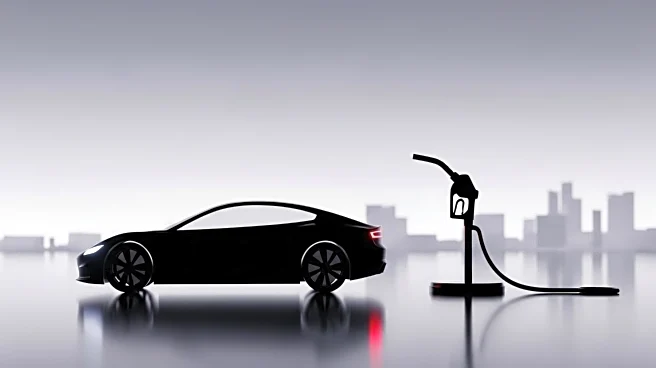What's Happening?
U.S. carmakers are increasingly refocusing on petrol and hybrid vehicles, a shift influenced by changes in regulatory policies and market dynamics. The move comes as the pace of electric vehicle (EV) adoption has not met earlier expectations, despite initial investments driven by global emissions regulations. The change is partly attributed to President Trump's policies, which have reduced incentives for EV purchases. While sales of EVs continue to rise, the industry is recognizing the need for flexibility in technology offerings. This shift is seen as a multibillion-dollar opportunity by some industry leaders, such as Ford's CEO Jim Farley. However, the resurgence of petrol vehicles is not uniform globally, with China continuing to lead in EV sales.
Why It's Important?
The shift back to petrol and hybrid vehicles has significant implications for the automotive industry, particularly in the U.S. and Europe. It suggests a potential slowdown in the transition to electric vehicles, which could impact efforts to reduce greenhouse gas emissions. This change may benefit traditional carmakers who have invested heavily in internal combustion engines, providing them with a longer runway to adapt to market demands. However, it also raises concerns about losing ground to Chinese manufacturers who are advancing rapidly in EV technology. The industry must balance investments in both petrol and electric technologies to remain competitive.
What's Next?
Carmakers are likely to continue investing in both petrol and electric vehicle technologies, aiming to offer a diverse range of options to consumers. This strategy, known as a multi-energy approach, allows companies to adapt to unpredictable consumer preferences and regulatory changes. The industry will need to monitor developments in China closely, as its advancements in EV technology could widen the gap with Western manufacturers. Additionally, carmakers may face pressure to innovate in hybrid technologies to bridge the transition between petrol and electric vehicles.
Beyond the Headlines
The shift in focus may have broader implications for environmental policies and consumer perceptions. As carmakers navigate this complex landscape, they must address potential mixed signals sent to consumers about the future of vehicle technology. The industry’s ability to offer flexible solutions could be crucial in maintaining consumer trust and meeting diverse market needs.









